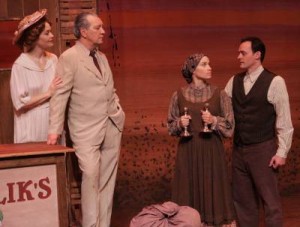
Black and white photos show immigrants arriving in the United States in the early 1900s as the sound of a howling wind blows across the southeast Texas plains. While a newspaper headline announces “Victims Of Russian Massacres,” a sign welcomes travelers to Galveston, the “Treasure Island Of America.” A foreign-accented male voice is heard singing a beautiful but mournful tune: “The stars can see what we cannot, the stars remember what we forgot. See that shining spark. God is there in the dark…”
These are the opening moments of The Immigrant, an exquisite “New American Musical” now getting its West Coast premiere at the Colony Theatre. This is a musical play with heart, the compelling (and still relevant) story of a quartet of characters you will come to care deeply about by evening’s end.
The Immigrant is the musicalization of Mark Harelik’s play of the same name. With book by Harelik, music by Steven M. Alper and lyrics by Sarah Knapp, The Immigrant tells the true story of actor/playwright Harelik’s grandfather’s first 33 years in the United States.
Haskell Harelik (the Americanization of his Russian-Jewish name) is pushing a cart and selling “‘Pananas’ A Penny A Piece” in rural Hamilton, Texas when he meets Milton and Ima, the town banker and his salt-of-the-earth wife. Despite not speaking English, Haskell manages to communicate to the American couple that he would like to wash his hand … and rent a room in their house. Milton wants nothing to do with the stranger, but Ima invites him into their home, warm-hearted and welcoming until Milton informs her that Haskell is a Jew. Ima responds, “It never occurred to me that he was a Jew,” to which Milton retorts with a wink, “Well, I saw his horns, honey. What’s wrong with you?” Clearly, things are not as black and white (Ima=good/Milton=bad) as they seem at first glance, and as the months pass, Haskell learns English (and local culture) from his American friends, while they have their eyes opened to worlds outside Hamilton by this unassuming yet enterprising foreigner.
Much of Milton and Ima’s discussion of the merits/drawbacks of befriending Haskell take place in a song (“A Stranger Here”). In fact, one of The Immigrant’s strongest points is the way Alper and Knapp have integrated dialog from Harelik’s play into their songs. These are not just musical numbers for the sake of having musical numbers. They are integral to the storytelling.
Soon, everyone is buying Haskell’s bananas (Ima’s friend brought her some banana muffins, and Ima returned the favor with her banana bread), and Haskell writes to his wife Leah about his wonder at “living in the house of a banker!” Still, life is not easy in a strange new land with “no shul, no Rabbi, and no Jews.” At least life is safe here, safe from the pogroms that killed so many of his fellow Jews in his native Russia.
In the song “Changes,” Banker Milton advises Haskell that “your fruit, it rots. It’s not worth the trouble. Sell them notions, sell them sundries,” but Haskell persuades Milton that selling apples, oranges, and pears from a bigger cart would a better business for him because when “I sell sweet fruit, happy my heart.” Milton agrees to finance Haskell’s new enterprise on condition that “You don’t jew me and I won’t jew…” He stops himself from finishing his sentence and apologizes, suddenly aware that even casual slang can wound and demonize.
Even worse than words is the physical attack from fearful/ignorant Texas natives that Haskell suffers while selling his wares. His solution is simple. “I don’t go back there,” he tells Milton. “I’m not a brave man. I get scared. I run. It’s not the first time.”
Eventually Haskell solves this problem by buying his own shop (no need to be out on the road) and by trading in the clothes which mark him as a Jew for outfits that allow him to fit in. His wife Leah, who has joined Haskell in Texas, lashes out at him about this (“You’re a Jew!” she sings angrily. “I married a Jew!”) and lets him know in no uncertain terms that she hates her new surroundings (“I don’t want this place, this new life you found. I don’t want this sky. I don’t want this ground. I don’t want it. I don’t want it. I don’t want it!”)
Haskell and Leah’s acclimatization to America, the birth of their three American sons (one of them the playwright’s father), their friendship with Milton and Ima, and Haskell’s later estrangement from Milton make up the second act of The Immigrant, an emotional journey in which all four characters have learned from each other, and grown in the process.
Hope Alexander, making her Colony debut along with her cast of four, has directed with sensitivity, and an emotional connection to the story which doubtless comes from her own Russian-Jewish immigrant grandparents.
Himself “a stranger here,” recent New York transplant Christopher Guilmet is absolutely superb as Haskell, shy, fearful, and inarticulate at the beginning, growing stronger, more confident … and more American as the years pass. Cynthia Marty captures all of Ima’s innate goodness in conflict with her suspicion of strangers. Native Texan Joe J. Garcia manages to make Milton both grumpy and compassionate, a clever businessman with a warm heart. Completing the foursome is gorgeous Monica Louwerens, who shows us Leah’s transformation from the apprehensive newcomer, head covered in a traditional scarf, to well-coifed modern American housewife and mother.
All four performers sing as beautifully as they act, and that is no easy task here, for Alper’s music bears a strong resemblance to that of Adam Guettel (Light In The Piazza, Floyd Collins) with an occasional bit of Stephen Sondheim thrown in for good measure. In other words, these are complicated melodies frequently bordering on the discordant, with occasional bursts of melody like fresh water major cords in a sea of minor notes. I heartily recommend listening to the original cast CD as I did before seeing the show. Alper’s melodies take getting used to, but they are worth the effort. Musical Director Dean Mora and his small (uncredited) orchestra play Alper’s complex harmonies (the orchestrations are also uncredited) with consummate skill.
Once again, the Colony has assembled a superb design team. John Iacovelli’s set transports the audience to rural Texas, with but a lone windmill breaking the bleakness of the prairie. A. Jeffrey Schoenberg’s costumes cover several decades and two continents. Don Guy’s lights the stage with the warm Texas sun. Drew Dalzell’s sound design is his usual fine work. Joni Rudesill’s hair and wig design are first rate with the exception of Ima’s final wig, which does not convince.
Over the past fifteen years, the Colony’s annual musicals have been a yearly treat for me, and I have fond memories of “How To $ucceed,” “Rags,” “Side Show,” and many others. The Immigrant’s small cast reflects the budget limitations which have reduced Colony casts to an average of two to three actors per production over the past few years, but there is no loss of quality here. This is a delicate, lovely, and deeply moving chamber musical which in its own intimate way satisfies as much as a big cast/big stage production at the Ahmanson or Pasadena Playhouse.
The Colony Theatre, 555 North Third Street, Burbank.
–Steven Stanley
April 5, 2008
Photos: Michael Lamont




 Since 2007, Steven Stanley's StageSceneLA.com has spotlighted the best in Southern California theater via reviews, interviews, and its annual StageSceneLA Scenies.
Since 2007, Steven Stanley's StageSceneLA.com has spotlighted the best in Southern California theater via reviews, interviews, and its annual StageSceneLA Scenies.







 COPYRIGHT 2024 STEVEN STANLEY :: DESIGN BY
COPYRIGHT 2024 STEVEN STANLEY :: DESIGN BY